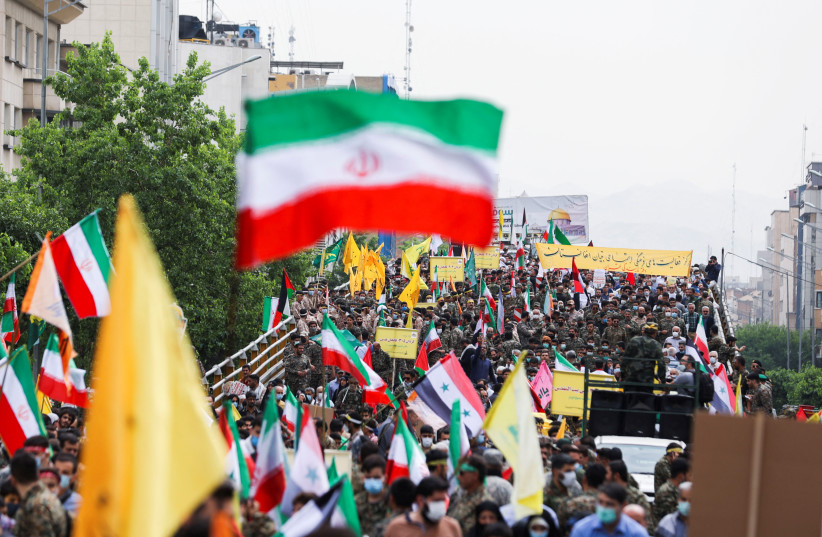In his historic address to Congress, Ukrainian President Volodymyr Zelensky referred to Russia, Iran and the use of Iranian drones in attacking Ukrainians as “one terrorist that has found the other.”
It took the horrendous magnitude of the September 11 attacks to drive home the message that international terrorism looms as a large menace in our times and must be dealt with firmly and precipitously.
While the world has been mainly fighting terrorist groups, the sources of terrorism have been left intact, shielded by the principle of national sovereignty in international relations and spurned by their state sponsors. What is more important than fighting these groups is to decisively disable regimes ensconced in their capitals, who are determined to agitate and continue their support of rogue states, and sponsorship and training of organizations that fit their priorities and agenda.
A leading sponsor of international terrorism aimed mainly at the United States and Israel is the Islamic Republic of Iran. It has long been identified as an active strategist, planner, trainer and bankroller of major terrorist organizations, mainly in the Islamic world. The most glaring example was the 444-day captivity of American diplomats in Tehran in the first year it was established. The pattern of hostage-taking continues to this day, as there are still foreign nationals, including US citizens, among those held captive in Iran.
Iranian internal oppression and the world's silence
Until recently, the Iranian regime’s treatment of its own nationals inside and outside its borders was of lesser concern to other nations. The world community has a selective memory, as economic interests take the upper hand. But every segment of the Iranian population, women, youth, workers, teachers, lawyers, students, academics, scientists, journalists, artists, ethnic and religious minorities, and those who embrace other religions, has tasted the venom of Islamic terror in the last 43 years of its rule. Executions, imprisonments, inhumane treatments and torture have been touted as divine rights of the clerics.

The Islamic Republic’s human rights violations and records in the last four decades have been diverse and glaring. That’s the one area where the regime has been an equal employment opportunist: serial killings of the most prominent political figures and journalists, kidnappings and disappearances in back alleys, banning hundreds of news publications and the imprisonment of their editors, forced confessions, amputations, kangaroo courts, public hangings, executions of the youths, and the inhumane treatment of women and the archaic laws that govern them.
THE ISLAMIC Republic of Iran’s name has also been engraved in history as the only country to openly order the assassination of a foreign author and put a price on his head. The world recently witnessed its malign and lingering repercussions.
Countries in the world tended to forget Iran’s human rights records. The West had positive views of its presidential elections. It welcomed the so-called reformists, former presidents Hassan Mohammed Rouhani and Khatami, who had identical doctrines and agendas as the current president, Ebrahim Raisi, cajoling the same fanatic direction and unquestionable rule of the unelected supreme leader.
Just recently, the regime executed two young men. The lifeless body of the 23-year-old, who allegedly challenged the rule of the clerics, hung from a construction crane in the holy city of Mashad. Another young man, also 23 years old, was hanged for the crime of moharebeh (enmity against God). They belonged to a young, proud and able generation that should flourish and develop rapidly as the country’s most valuable resource.
The regime silenced their aspirations, hopes and dreams but was not able to silence the sound of defiance that has echoed for more than three months in every street and every city. Iranians will not forget, Mahsa Amini, Majidreza Rahnavard, Mohsen Shekari...
Putting an end to the clerical regime is the prerogative and responsibility of Iranians themselves and they should fight resolutely for what they think is right for their nation. Effectively banning Iran’s oil exports will stop the regime’s financial sources of repression and terrorism.
Free industrial nations can prohibit all economic relations with the Islamic Republic, including its oil exports, through joint resolutions. It’s only then that the regimes’ supporters inside, currently enjoying prosperity and astronomical wealth from these revenues and overt and covert plunders and embezzlements, will revolt against their own protector.
A young, defiant generation yearns for a new life. A generation jaded by the rules and restrictions of an anachronistic, revolutionary era now struggles to establish a secular government and is willing to give up its life to achieve its goal and redefine what it means to be Iranian.
The writer, whose family fled Iran, is the director of program review at the Voice of America in Washington. From 2013 to 2021, she was the director of Voice of America-Persian, launching the first VOA Persian 24/7 TV and digital channel into Iran. She has lectured at Georgetown and American University in Washington.
The views expressed in this article are the author’s own. They do not reflect the views of Voice of America, the US Agency for Global Media, or the US government.
